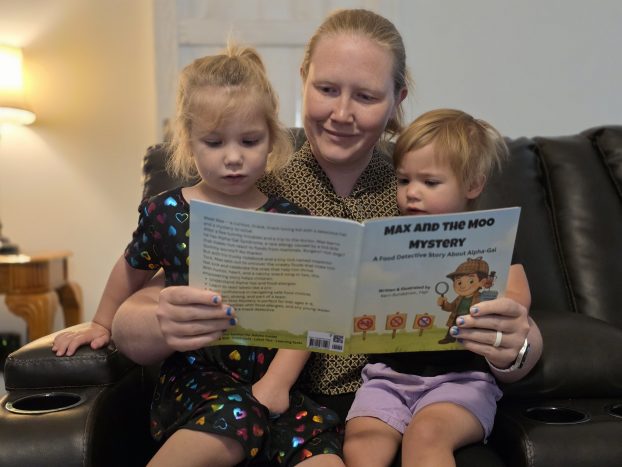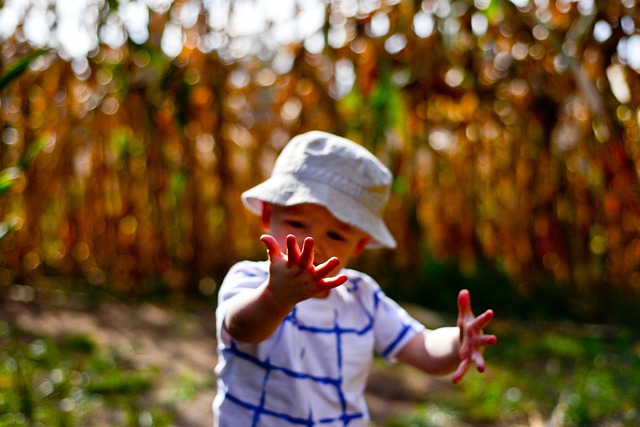Discovering the magic of Christmas, one tree at a time
Published 12:41 am Sunday, December 24, 2023

- Santa pays a visit to the farm, taking a picture with Audrey Kott, whose family has owned Mt. Airy for generations. Photo courtesy of Sarah Kott.
|
Getting your Trinity Audio player ready...
|
It seems everyone knows the story of Charlie Brown making his way to a practically deserted Christmas tree lot, finding nothing but a small sapling with barely any branches.
“I guess you were right, Linus,” Charlie said to his trusted friend. “I shouldn’t have picked this little tree. Everything I do turns into a disaster. I guess I really don’t know what Christmas is all about.”
Except we know how that story ends — and so does Sarah Kott, whose family has owned Mt. Airy Farm for generations. She’s helped her family sell Christmas trees from the farm every year since she was a little girl. And while they expect to have 400 of some of the most beautiful trees chopped down for the holiday season, there is one particular tree so many people ask for.
Trending
“Sometimes people come out, and they’re like, ‘We want the Charlie Brown tree,’” Kott said. “And we’re like, ‘Well, you know, Charlie Brown-ish looking trees are not trees that we count as sellable.’”
Yet, that doesn’t stop anyone from venturing out into the rows of perfectly planted trees that make up J&J Treeland at Mt. Airy Farms, just outside of the town limits of Farmville, trying to find the one that represents the Christmas spirit best for them.
“We still have people go and find trees that we would have never marked as sellable,” Kott said. “And you never really know what people are going to find. We had a tree that my grandfather was going to cut out of the field to make more room for replanting, because it seemed to have grown out instead of up. So, it might have only been six feet tall, but it was about eight-and-a-half feet wide.
“Yet, we had someone that was like, ‘Yep! That’s our tree!’”

A group of Mt. Airy staff gathers at the farm. They include, from left front, Audrey Kott, John Young,
Lester Williams and Rae Dial. On the back row are Sarah Kott and Nathan Nance.
THE HISTORY OF MT. AIRY FARMS
Kott’s grandfather is John Young, who first opened the Christmas tree lot with his friend Jim Bowen in 1978, calling it J&J Treeland after their first initials. The operation was small at first, and after a few years, Jim moved away, selling his share of the business to Young. But it has thrived.
At the height of its operation, J&J Treeland not only sold trees to local families, but would load up tractor trailers to export trees to other states. Young was even in charge of creating Christmas roping for Colonial Williamsburg.
Trending
These days, it’s much more of a family operation, with an occasional hired hand to help out. Familiar faces like Lester Williams, who does a lot of the heavier lifting. And John Young? Yes, he’s still out there, showing that 85 is just a number.
Kott became more involved about 15 years ago, handling the social media and customer contact sides of the business. Yet, the tree farm has been a part of her life from the beginning.
“I grew up there,” Kott said. “My grandparents actually babysat me for my mom. So, I grew up standing at the edge of the tractor-trailers as they were unloaded, with a little clicker to count every tree that was unloaded.”
There are far fewer trees these days, partially because of the changing market, but also because of a devastating drought a little more than a decade ago.
“The average tree takes seven years to mature,” Kott said. “So, it takes a while for something like bad planting seasons to affect us, but we felt it in recent years.”
The drought cost the family two years of crops. And while Young tried to mitigate by planting older saplings and young trees to make up the difference, J&J Treeland was still quite limited over the past two years, offering just 200 trees.
“We’ve been doing a limited season to try to not sell the farm out completely,” Kott said, adding that the drought is one of the main reasons why live trees are becoming so expensive in recent years — there just aren’t as many available as there were in the past.
“I’ve had people reach out from New York and Pennsylvania asking if we had any trees we could send them,” Kott said. “That’s why you see the Lowe’s and Walmart prices have risen significantly in the past couple of years, because they’re wanting to get trees.”

Young Charlotte Kott comes prepared for Christmas tree work, armed with a pole and saw.
A SHORT WINDOW THIS YEAR
This year, 400 trees will be available — but the windows to come out and get one is short, on a first come, first serve basis.
“We provide saws, or we can cut trees down for people,” Kott said. “We do allow people to bring in their own handsaws, but we don’t let anyone bring in chainsaws. But we do have our own chainsaws that we can help with if someone needs it.”
And workers hand out measuring sticks, too, because a tree that might look small out in the field could be much bigger than someone thinks.
Typical trees are between six and eight feet, and range in price anywhere from $65 to $110, depending on species.
But for Kott and the Young family, this isn’t a business as much as it is a tradition — one that has passed down not only through their generations, but generations of customers, too. Like one couple who met while attending Longwood University.
“One of their first dates was coming out to get a tree,” Kott said. “And they have come every year since. So, we have seen their kids, and now some of their kids are married. So now they come out with their kids and their significant others. And so I am just waiting for grandkids to start popping up with that family.”
You can start — or continue — your own tradition beginning this weekend. For more details, you can call the farm at (434) 202-4333.





